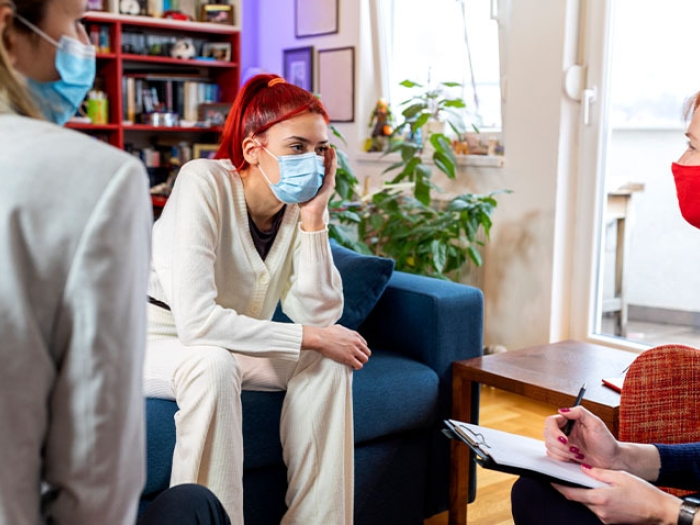A new study probes the benefits and drawbacks of digital media use among child and teen campers.
1:00 PM
Author |

Summer camp often conjures up images of wooded retreats with lakes and cabins, camping under the stars and making new friendships over campfires and outdoor adventures.
MORE FROM THE LAB: Subscribe to our weekly newsletter
But today's camp counselors have a new scene to contend with: Young campers on their phones.
New research from University of Michigan C.S. Mott Children's Hospital delves into how digital media might affect the camp experience — both positively and negatively. The abstract was shared at the Pediatric Academic Societies meeting in Toronto.
"Summer camps represent a unique opportunity for social-emotional development by allowing children to separate from their usual family and peer environment while learning new skills or spending time outdoors," says lead author Ashley DeHudy, M.D., a pediatrician at Mott who spent years working at different camps.
"When I was a camper, there were no smartphones. And even as a counselor, the camp I spent six summers working for was in rural West Virginia in a no-radio zone. There was literally no cellphone service. Now, with our "screen dominant" society, I wondered how digital media might change the camp experience."
As a society, we spend a tremendous amount of time on screens and with digital media, but we don't understand the full impact that it is having on children.Ashley DeHudy, M.D.
Pros and cons of screen time at camp
Researchers surveyed 620 people representing 331 camps in the United States and Canada, including camp directors, nurses and other staff members. The team pulled out common themes from answers, which were mixed, as respondents reported both pros and cons of screen time.
SEE ALSO: Can Parents' Tech Obsessions Contribute to a Child's Bad Behavior?
On one hand, digital media provided positive opportunities, such as taking photos and making slideshows, helping camp staff stay connected to each other, keeping parents of children with special needs updated and providing technology activities, such as coding. Devices also helped with entertainment, allowing for dance parties, movies and video game tournaments.
But many also described challenges digital media introduced to the camp environment.
There were common reports of campers so preoccupied with media interactions that they were unable to fully engage in camp activities. Communication between children and parents were more frequent than ideal, with some parents picking their child up early after an upset call home without camp staff being aware there was a problem. Devices could also lead to children being disruptive during instruction and encourage cyberbullying and late bedtimes.
As one respondent wrote, campers are "more worried about their phone than the poison ivy bush they're about to step in."
Some kids were also often discouraged from participating in talent shows or other activities in fear that their pictures could end up social media and be embarrassing. Digital media use among camp staff was also identified as problematic when it pulled them away from their roles.
"Negative themes predominately focused on distraction and kids not connecting to the camp community," DeHudy says. "There was repeated concern about campers' obsession with social media and reluctance to participate in certain activities due to photographs or videos that may embarrass them."
On the flip side, another emerging theme was that some kids and teens welcomed the technology break.
"Some said that while hesitant about the separating from phones at first, there were students who reported feeling relieved and relaxed without the pressure social media creates in their lives," DeHudy says. According to one respondent, "Campers were ready to give up their phones and take a social media vacation."
Sixty percent of respondents reported having a written policy for digital media use at camp that applied to both campers and staff. Some camps would collect all phones at the beginning. Enforcing restrictions were sometimes difficult, however, because some parents would help their kids sneak phones. Camps also struggled navigating rules because phones often provide other functions, such as an alarm or camera.
Wider trends in digital media use
Children in the U.S. are estimated to spend up to nine hours a day using digital media, but no prior studies have described how digital media are used at U.S. summer camps.
DeHudy says parents who are worried about digital media at camp should research camp programs and their policies ahead of time.
"Parents should envision the kind of camp experience they hope their child will have and find a camp with a similar culture and mission," DeHudy says. "If you want your child to have an experience disconnected from social media, look for camps whose policies match that in order to establish the rustic experience you're looking for."
"Of course, if your child is attending a tech or science-themed camp, then you may be more comfortable with fewer restrictions on device use," she adds. "As long as families determine what overall goals they have for their children, doing research ahead of time will help them achieve that mission."
Parents should also discuss concerns about communicating with their child and ask camp staff about what kind of access kids will have to email or the camp's phone if they don't have cellphones.
"Camps want families and kids to have a positive, memorable experience," she says.
"As a society, we spend a tremendous amount of our time on screens and with digital media, but we don't understand the full impact that it is having on children," she adds." Having time away and connecting with the natural environment is essential. Camp is a really unique opportunity to establish a sense of community and form lifelong friendships. If parents allow kids to unplug from daily life and engage themselves at camp, it will be a very rewarding experience."

Explore a variety of health care news & stories by visiting the Health Lab home page for more articles.

Department of Communication at Michigan Medicine
Want top health & research news weekly? Sign up for Health Lab’s newsletters today!





